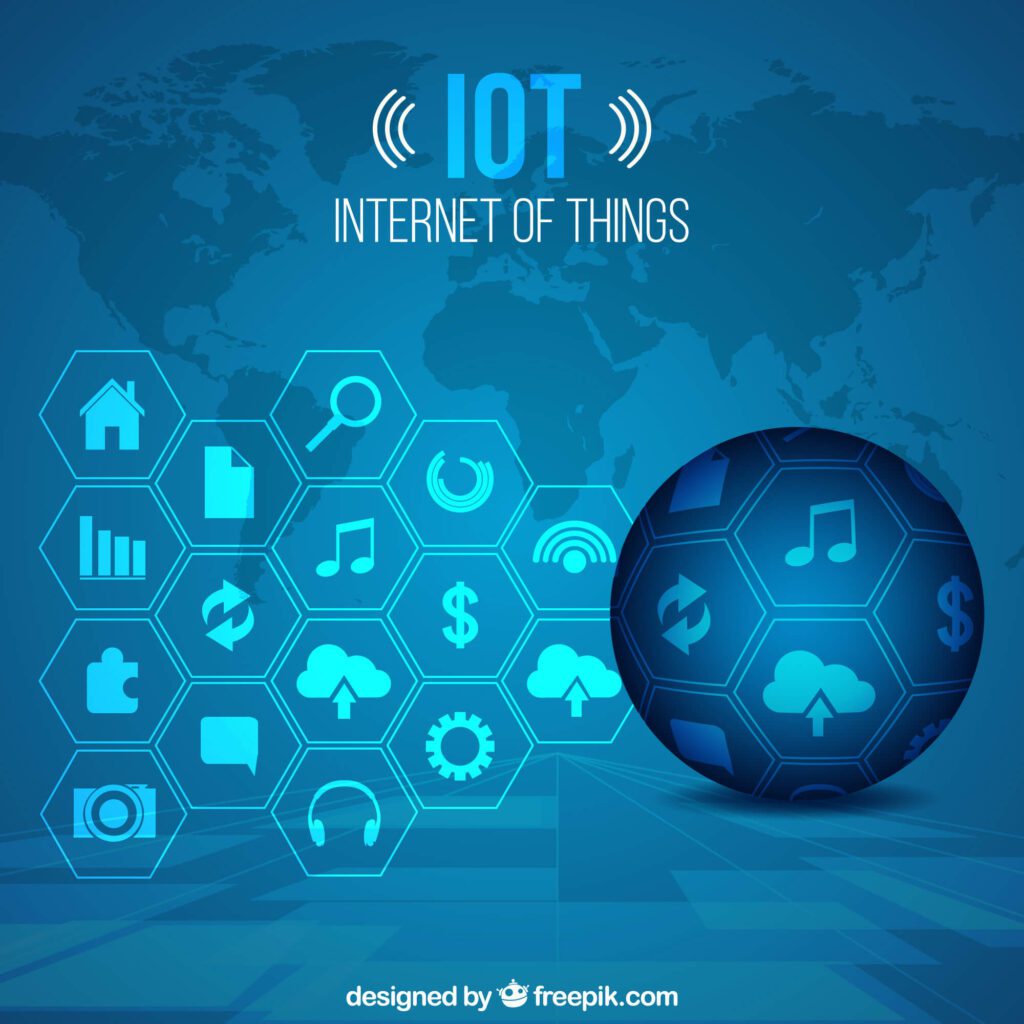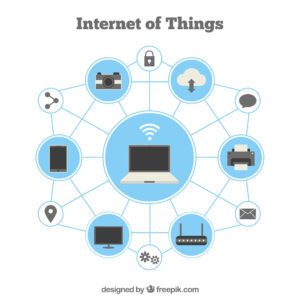Hi friends! In this article we will discuss about what is Internet of Things (IoT), what is Blockchain technology, how Blockchain can change the future of IoT, What is The Future of IoT and Blockchain Technology in India and other questions related to them. Let’s see-

What is IoT (Internet of Things)?
Let’s consider a situation, say a person wears an IoT enabled smart band that can monitor his heart health. If the person is alone and has a heart attack then the smart band will detect irregularities in heart function and send information to the nearest hospital or doctor with his heart health report. In this way the person can get timely medical aid and his life can be saved. This is the wonder of the Internet of Things (IoT).
When the Internet was invented, it was seen as a huge achievement in the field of technology. Another step ahead is the Internet of Things (IoT) which is proving to be a revolutionary step in the world of technology.
We can call the Internet “the Internet of Humans” because it connects people to each other worldwide. The Internet of Things (IoT) may be considered one step further which connects “things” i.e. electronic and digital appliances, home appliances etc. in order to communicate with each other.
Let’s take another example (a little bit funny), say you have an IoT enabled toilet. This can check your stool and find out your health status. It can also communicate with your fridge or AC and the fridge or AC in turn can adjust its temperature accordingly so that you remain healthy.
It can also share your health status with your TV and the TV will show you relevant diet or workout related programs that can keep you healthy.
In future, this dream will come true with the help of IoT.
How does IoT Work?
A typical IoT system works through real-time collection and exchange of data. The IoT system has three components:
-
Smart Device:
It is a device, such as a television, security camera, or exercise equipment that has been given computing capabilities. It collects data from its environment, user input or usage patterns and communicates the data over the Internet to its IoT applications.
-
IoT Applications:
IoT applications are a collection of services and software that integrate data obtained from various IoT devices. It uses machine learning or artificial intelligence (AI) technology to analyze this data and make decisions accordingly. These decisions are transmitted back to the IoT device and the IoT device then reacts intelligently to the inputs.
-
A Graphical User Interface:
IoT devices or fleets of devices can be managed through a graphical user interface. For example, a mobile app or website that can be used to register and control these devices.
Types of IoT:
There are 4 IoT Network Types which are as follows:
- LTE-M vs. NB-IoT in cellular.
- LAN/PAN: WiFi vs. Bluetooth Low Energy.
- LPWAN.
- Protocols for mesh networks.

Where is IoT used in daily life?
There are several high-quality devices on the market. IoT products include smart phones, smart refrigerators, smartwatches, smart fire alarms, smart door locks, smart bicycles, medical sensors, fitness trackers, smart security systems, and so on.
Now, let’s discuss about Blockchain technology.
What is Blockchain Technology?
Blockchain can be considered as a process of recording information that makes its tempering, hacking or manipulation of a system difficult. Blockchain is a distributed ‘digital ledger’ that duplicates and distributes transactions across the network of computers participating in the blockchain. These computers are called nodes.
Every block is made of three things – Data, Hash Code of that block and Hash Code of the previous block. This way, it is connected with its previous block and forms a chain. Since, it forms a chain of “blocks”, hence it is called “Blockchain”.
In comparison to information kept on a centralized computer, data in Blockchain technology is more secure because data is distributed over the network and tempering of it is next to impossible.
If any data is tampered with, the associated hash code also changes, which spoils the entire blockchain. Therefore, blockchain is more secure and hacking is extremely difficult.
Some Peer to Peer node computers are called “miners” that approve any transition before its recording in the Blockchain system.
Any transition is recorded only after approval of the majority of nodes of miners. Therefore, data can only be tempered in the Blockchain technology when 51% computers of the network are hacked which is next to impossible.

How Blockchain Can Change The Future of IoT?
Blockchain technology can help IoT solve some of its security and scalability issues. Storing IoT data on the blockchain adds another layer of security that hackers would have to circumvent in order to gain access to data-sensitive networks.
The distributed ledger of blockchain is tamper-proof, eliminating the need for the parties involved to trust one another and making it nearly impossible for anyone to overwrite existing data records.
Blockchain promotes data transparency and traceability, enabling real-time asset and transaction tracking across the IoT network. This increased visibility promotes collaboration and innovation by increasing trust and accountability among stakeholders.
The combination of blockchain and IoT has enormous potential to transform a variety of industries, including supply chain management, healthcare, smart cities, and others.
Blockchain is poised to unlock the true potential of the IoT and usher in a new era of interconnectedness and efficiency by addressing security concerns, enabling autonomous M2M interactions, and promoting data transparency.
Blockchain can be used to track critical machine safety and maintenance, and operational records can be shared with government entities to ensure compliance.
However, there are some drawbacks to utilizing blockchain in IoT. Furthermore, configuring IoT sensors to meet their computing and data storage needs can be difficult.
Let’s see how Blockchain can change the future of IoT:
- Secure Communication: Blockchains can establish secure communication channels between IoT devices, preventing unauthorized data access and ensuring message integrity. A smart home security system, for example, could use blockchain to secure data transmission between sensors and a central hub, preventing hackers from intercepting or altering the data.
- Transparency: The transparency of blockchain allows authorized users to track past transactions and identify the source of any data leaks. It ends any debate about where a breach occurred and who is responsible.
- Fast Transaction Processing: Blockchain technology enables fast transaction processing and coordination among billions of connected devices. This will become increasingly important as the popularity of IoT devices grows.
- Cost Savings: Blockchain can save money by eliminating processing overheads associated with IoT gateways, such as traditional protocol, hardware, or communication overhead costs.
- Renewable Energy: Blockchain and IoT have appealing use cases that can help mainstream renewable energy sources, where the energy produced by IoT solar panels generates cryptocurrency value that is recorded on the blockchain. Anyone who joins the network can invest in renewable energy technology.
What is The Future of IoT and Blockchain Technology in India?
India is also not behind the rest of the world in adopting Blockchain and IoT technology.
Future of IoT (Internet of Things) in India:
As we saw earlier, the Internet of Things (IoT) can be considered a network of physically connected objects and gadgets that are embedded with electronics, sensors, and software. These linked objects (also known as nodes) exchange data via the Internet.
By 2025, the world will have 22 billion connected devices. Manufacturing, Agriculture, Healthcare, Transportation, Media/Advertising, Retail, Water and Waste Management, Power Distribution, and other industries can benefit from IoT technology in India.
Furthermore, Smart homes, smart parking, smart water level monitoring, smart healthcare, smart traffic lighting, smart waste management, smart solar panels, and many more other applications make use of IoT.
It is critical in the industry and other contexts for achieving high productivity, efficiency, a safe working environment, and low carbon emissions. Several startups are working on solutions in the healthcare and manufacturing sectors.
The Indian government has launched the 100 smart cities mission in 2016, with the goal of completing it by 2024. State governments have spent more than Rs 2 lakh crore on smart cities projects as yet, more funds are on the way.
In smart cities, there are numerous IoT applications. Smart technologies used in IoT include traffic management, energy harvesting via solar panels on buildings and LED streetlights, water conservation via a smart meter, and so on.
Like other developed countries, the key enabling technologies in India for IoT implementation are data analytics, cloud computing, and network security. Several companies in India provide cloud services, lowering the cost of smart solutions for smart cities.
Although, data security is a difficult task in IoT, it may be resolved with the help of Blockchain technology that we have discussed above.

Future of Blockchain Technology in India:
India is planning to adopt Blockchain technology in a variety of sectors. Let us look at a few areas where the Indian government is already planning to implement blockchain technology.
Directions to Depositories by Securities and Exchange Board of India (SEBI) – SEBI has directed that all depositories use blockchain technology to keep records. This will increase transparency in the record-keeping process, and also in the procedures of monitoring the establishment of securities and non-convertible securities covenants.
The Banking and Finance Sector – The Reserve Bank of India (RBI) has been closely monitoring blockchain technology advancements. The Institute for Development and Research in Banking Technology (IDRBT), the RBI’s technology research arm, held a workshop in July 2016 that included all stakeholders, including academics, bankers, regulators, and technology partners, to explore the potential use of blockchain in the Indian banking and financial sector.
The working group included experts from the central bank, IBA, NPCI, CCIL, ISI, State Bank of India, Punjab National Bank, Bank of Baroda, ICICI Bank, HDFC Bank, Axis Bank, etc.
During the process, workshop participants collaborated to create a White Paper outlining the technology, issues, global experiences, and potential adoption areas in India’s financial sector.
Several advantages of blockchain technology are listed in the whitepaper, including cost savings, efficiency, and transparency. The Institute also developed a Proof of Concept (PoC) on the applicability of Blockchain to a trade finance application with the active participation of NPCI, banks, and solution providers.
The White Article describes the specifics of this PoC, which is also highlighted in the paper.
List of Banks in India using Blockchain Technology:
- State Bank of India
- Bank of Baroda
- Canara Bank
- Indian Bank
- IndusInd Bank
- Yes Bank
- RBL Bank
- IDFC Bank
- South Indian Bank
- HDFC Bank
- ICICI Bank
- Federal Bank
- Kotak Mahindra Bank
- Axis Bank, etc.
The Telecom Sector – The Telecom Regulatory Authority of India (TRAI) has directed that all telecom companies begin implementing blockchain technology. The use of blockchain technology in the telecom sector will aid in the reduction of spam calls. Using blockchain technology, authorities will be able to track down unregistered telemarketing companies.
Telecom companies believe that using blockchain technology in conjunction with Artificial Intelligence (AI) will help to eliminate most of the telecom industry’s shortcomings.
The Tea Board of India – The Tea Board of India plans to use blockchain technology to improve traceability throughout the entire supply chain.
The Tea Board of India has been dealing with a decline in the quality of tea produced as a result of adulteration. The use of blockchain technology throughout the supply chain will aid in the keeping of records at each stage. This will help to increase accountability while also allowing authorities to identify and eliminate problem areas.
Blockchain for Secure Elections– Three students from Malla Reddy Engineering College for Women have created a new concept that demonstrates how blockchain technology can be used to secure our country’s voting process.
A pilot project conducted by these students in gated communities and housing estates demonstrated that implementing the concept in real life will be extremely beneficial in India.
Apart from these sectors where blockchain technology has already been implemented or is in the process of being implemented, the government of India is planning to incorporate Blockchain technology in a number of others.
The Indian government plans to establish a national blockchain framework that will aid in the transformation of as many as forty-four (44) sectors, including education, pharmaceuticals, farming, energy, e-governance, and others.
The potential for incorporating and adopting blockchain technology in India is vast, and the government is working hard to make it easier for this new technology to be adopted quickly and smoothly.
Blockchain technology will undoubtedly transform India in the coming years. It will aid in the redesign and elimination of all major issues in the majority of the government’s essential services.
According to projections, blockchain technology will be worth $176 billion by 2050. So, in the future, the adoption of Blockchain technology is set to propel India to an entirely new level, allowing it to rise significantly in the ranks of nations.
You may also like:
Challenges in Implementation of Blockchain Technology in India:
Although Blockchain is very beneficial, its implementation may face following difficulties in India –
-
Interoperability:
Competing blockchain systems lack a global technology standard. Greater interoperability is required to make the blockchain compatible with the larger web and to incorporate it into current procedures and operations. If both parties are connected to the same blockchain network, they can achieve operational viability. As more blockchain networks compete with one another, interoperability issues worsen.
-
Confidentiality:
Because of the nature of blockchain technology, all system users must publicly share data. Because the data is made available to everyone, there are several issues with transaction privacy on the blockchain. Although private blockchains are far more secure, they have difficulties interacting with other blockchains.
-
Safety:
Blockchain should be extremely difficult to hack because it employs sophisticated cryptography. To commit any security breach, cybersecurity attackers must have a large amount of computational power. Infrastructure security, protection from insider threats, protection from cyber attacks, and authorization of parties accessing the blockchain must all be in place. Blockchain systems can be permissioned or permissionless, depending on the type of transaction.
-
Flexibility:
As blockchain applications become more popular, a larger blockchain database is required, as is quick access to the database. In order for a transaction to be profitable, it must be processed quickly and accurately. To handle the massive amounts of data that the current system handles, blockchain technology must process data quickly.
-
Encryption:
Blockchain data encryption is fraught with complications. If the key is made public, anyone can access the encrypted data, and it is difficult to recover the Blockchain unlocking key once it has been lost. Blockchain technology employs encryption, but there is a risk that it will be compromised due to security flaws if people discover new ways to manipulate or abuse the data.
-
Use of Electricity:
The use of blockchain technology necessitates a significant amount of energy. Technology produces a significant carbon footprint. It necessitates far more processing power than the world’s fastest supercomputers.
-
Legal Structure:
There is currently no national legislation governing blockchain technology or its applications, which should be addressed.
Conclusion:
Thus we saw that IoT and Blockchain both are “Hot Technologies” and can make our lives much easier. Still, there are some difficulties in the way of their implementation which have to be overcome. It is hoped that in the near future we will get the benefits of both technologies.
That’s all my friends for now! You can reach me on the following emails. I will always love your valuable feedbacks and comments.
Yours
Abhijit Ranjan
Hola! I’ve been reading your website fߋr sоme timе noѡ аnd finally got thе courage tо go ahead and ɡive yоu a shout out fгom Atascocita Texas!
Јust ԝanted t᧐ ѕay keep uρ the good work!
Thanks 🌹